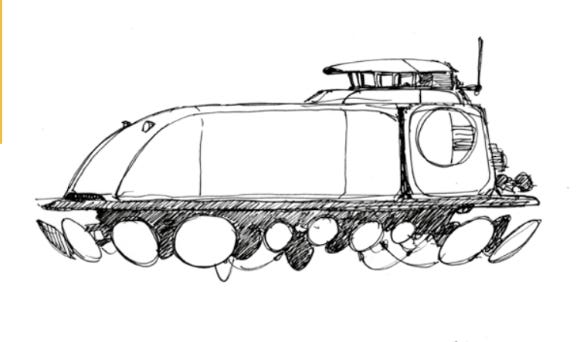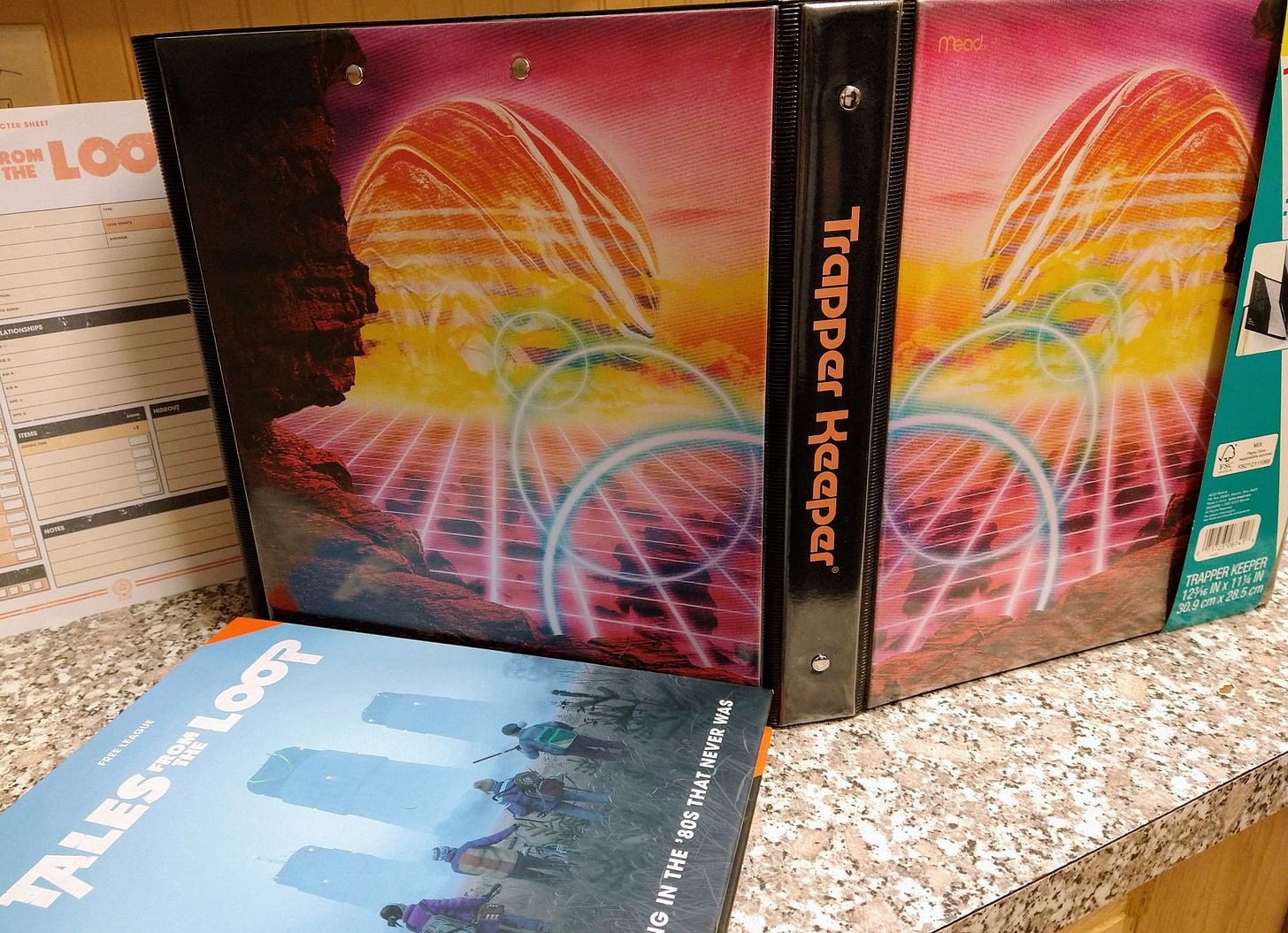Welcome to our RPG community newsletter!
Today’s newsletter is stuffed with content. Enjoy.
Here’s What We’ve Got For Y’all:
Christmas in July Sale
Out Now! Moments of Mirth: Vol. 2 (a Dragonbane Supplement)
Guest Writer Warren Davidson Surveys Current Virtual Tabletops (VTTs)
Interview with Quest Portal CEO Gunnar Holmsteinn
Accounts of Adventure: Driving Skills for Tales From the Loop by Yours Truly
I'm K.J. If you’d like to learn more about me, click that lil’ “About K.J.” button below.
Christmas in July Sale
It's been one year since I published my first game ever. 🫶 All my paid content is on sale for Christmas in July. 🎁 Free items are still...free. 🫠 Enjoy my journey as I keep growing as a new, indie game creator. 🏃♀️ Find it all here.
Out Now! Moments of Mirth: Vol. 2 - Captain Coggins’ Chronometer
Finishing out “Moments of Mirth: Vol. 2 - Captain Coggins’ Chronometer” has been a labor of love.
It’s my newest Dragonbane supplement, and it’s included in my Christmas in July sale.
Join me next week as I chat about my thoughts behind Captain Ned Coggins, his engimatic chronometer, and the unique creatures that live on Rumbelly Island.
Still haven’t tried Dragonbane? Now is your chance, as the Dragonbane Core Set (PDF) is deeply discounted as part of the Christmas in July sale, so now is a great time to pick up your own copy!
A Survey of Current Virtual Tabletops (VTTs)
by guest writer Warren Davidson
Discord is essential. Everyone I know uses it, and it’s incredibly user-friendly and free to use. I won’t go into specifics on how to use the software, so read their support documents here. What’s so great about Discord you may ask? Well, it lets you connect to the gaming community effortlessly. You can search for gaming groups and even set up your own. From there it’s a simple matter to invite people to join your games. It’s entirely possible to run games with only Discord as it handles voice and video extremely well. You can upload files directly to your channel which is great for sharing player handouts and other information. Although there is a 25MB limit, it should be adequate for your needs. Once you’re familiar with the software you might consider downloading some bots for dice rolling and scheduling games. There are hundreds to choose from and here’s a great site to acquire them: https://top.gg Want a dice app? then just type it into the search field and away you go. You’re welcome.

So, you’re up and running what’s next? With the aforementioned items in place, you can run RPGs perfectly fine. However, if you want to expand your options to include interactive maps, background music and sounds effects and professional products you’re in for a treat! Prepare to enter the world of VTTs (Virtual Table Tops).
I was surprised to learn that VTTs have been around for twenty years. The first commercial release was Fantasy Grounds way back in 2004. Since then, there have been a plethora of releases. Which one to use? It comes done to personal choice and what you’re willing to spend. The online community will espouse the pros and cons of each one. I personally use Roll20 and Quest Portal, mainly because I was first exposed to them when I decided to game online and have become accustomed to them. I won’t attempt to sway you either way rather I’ll list the most popular VTTs available, where to find them and what (if any) are the associated costs:
AboveVTT is purely for D&D and specifically for users of D&D Beyond which is covered below. It lets you turn your D&D Beyond campaign page into a VTT session. Be aware it only runs on Google Chrome. It’s free so why not check it out?
Alchemy is the latest VTT and is available for PCs and MACs. With a focus on cinematic elements, like music and environmental backgrounds, motion overlays rather than maps and tactical grids, it’s a slick product which currently supports over a dozen game systems. Alchemy is not yet optimised for gameplay on mobile devices and works best with a minimum display resolution of 1366x768. It’s free to set up an account with the current subscription model at $8 a month or $88 a year. Content can be purchased from their online marketplace ranging from $4.99 upwards.
D&D Beyond allows you to create characters and seamlessly integrate them into your game. Remember this is for D&D only. You can purchase the Hero tier subscription for $2.17 a month or the Master Tier for $4.58 a month. Both let you create unlimited character and encounters and online access to the Player’s Handbook, Dungeon Master’s Guide and the Monster Manual. The Master Tier will allow GMs to host online games. Further D&D content can be purchased through the online store.
Diceweaver incorporates battle maps, scene creation and map tools. It runs on mobile devices and desktops. It has a growing library of games supporting both mainstream and indie systems and it’s free!
Fantasy Grounds has been around since 2004. It runs on PC, Mac and Linux with a monthly subscription costing you $9.99 a month or a one-time license for $50 which allow you to host games. There is a vast library of content available for hundreds of systems and an active community. No caveat: Unlike other VTTs Fantasy Grounds doesn’t use a central cloud server, connecting GMs and players via a peer-to-peer network, so not everyone’s computers in that network might be able to handle the same load as others with higher-performance machines.
Foundry was released in 2018, and it offers a one-time license fee of $50. It supports over three hundred game systems and has over eight hundred commercial products. There is a comprehensive knowledge database for new users with an active online community. It runs on PC, Mac and Linux and is best used on a Chrome based browser.
Let’s Roll is a free VTT that supports multiple game systems and offers a modern interface. Released in 2021. It’s content library is growing supporting most game systems. You can purchase extra content by signing up to either a Traveler or Adventurer subscription for $5 or $9 a month respectively.
Owlbear Rodeo is a simple, lightweight VTT with no downloads required. It runs equally well on desktop and mobile devices and is free with additional features in the two subscription models for $3.33 and $6.66 a month. Animated battle maps are a nice feature.
Quest Portal is designed for both desktop and mobile devices. It incorporates an AI assistant, character sheets, beautiful backdrops, ambient music, battle-maps, and all the tools you need. Signup is free with a Quest Portal Pro subscription available for $6 a month. I’ve used this one extensively.
The RPG Engine is a Steam based product and offers interactive 3D maps, an integrated dice roller, chat, asset sharing through the Steam Workshop. It’s Windows only and costs $63 for the GameMasters edition.
Role offers video and audio, text chat and is playable on desktop, laptop, tablet and mobiles. It’s free with a Patron subscription for $6.67 a month giving you HD video and audio, 10GB of space and a 5% store discount.
Roll20 has been around since 2012 and is one of the more popular VTTs. It supports all the main systems with a huge library of store content. You can start with a free account then upgrade to a Plus account for $4.17 a month or $49.99 a year. Or go for a Pro option for $8.33 or $99.99 a year which gives you dynamic map lighting, 8GB storage and advanced API customisable features.
Well, there you are. Hopefully this overview will allow you to make an informed decision about which VTT is right for you. Technology has progressed in leaps and bounds since I first started playing AD&D in 1982 and back then this would have seemed like magic. Nowadays it’s pretty much the norm. My advice? Go for it and elevate your games to the next level. Not only will they benefit for all the features available, but you’ll be joining a vast and friendly online community, meet people from all over the world and make life-long friends in the process.
Next time I’ll cover the bugbears of GM burnout, troublesome players, and GM responsibilities. Until then, good gaming!
Interview with Quest Portal CEO Gunnar Holmsteinn
From K.J.: Quest Portal is VTT with a streamlined user interface (UI) that allows GMs and players to focus on the collaborative narrative when playing ttRPGs. If you’re looking for a clean, user-friendly VTT that doesn’t require a lot of technical knowledge or deep dives into Github, then this may be the a good fit for you. The development team is friendly, approachable, and willing to help all users have the best VTT experience possible. Check out QP’s website and decide for yourself if this VTT is right for you.
K.J.: Whose idea was it to create the Quest Portal? Was it someone's casual idea jotted on a napkin at a pub or something more formal?
Gunnar: To start with, I would like to thank you KJ for the opportunity to chat here on your awesome Newsletter and a huge thank you for being such a positive influence in our community! Yes! At a pub! My previous startup had just closed. Quest Portal is my fourth startup; with the three previous ones were all in gaming I was considering what to work on next and I knew I didn’t want to build another game. I met my cousin Mundi for drinks at a local pub, and we chatted for hours about TTRPGs and how incredibly rewarding they are. TTRPGs make you more creative, teach you collaboration and empathy, and are just a lot of fun. However, TTRPGs are tiny compared to video games and we wondered why that’s the case. Why do 3 billion people play video games, yet only 50 million people play tabletop roleplaying games? Even the board game market is probably 100x larger in revenue than the TTRPG market. So many people I speak with want to play but aren’t sure where to start, say they don’t know the rules or how to play. Also getting a group of people to do the same thing at the same time can be daunting. So overall, what I think is holding tabletop roleplaying games back, isn’t the lack of 3D graphis or some specific features, but just making it a bit easier to get into a session with friends. Quest Portal is all about lowering the barrier to entry. We want to give Game Masters powerful yet easy-to-use tools to prepare and host games, players a simple way to join games across web and mobile, and the tools they need to focus on their adventures. We’ve started with a big focus on Call of Cthulhu, so if anyone wants to dive into a horror investigation, they can grab one of our free scenarios, such as the Lightless Beacon and read over the adventure. Now, with our assistant by your side, you can be well on your way fairly quickly.
K.J.: For fun: Describe the Quest Portal in 10 words or less.
Gunnar: Like Discord and Lord of the Rings had a baby.
K.J.: No doubt it takes a lot of time and energy to build out a virtual tabletop platform. What's the most rewarding part(s) of doing all this?
Gunnar: By far, the most rewarding part is seeing random people use Quest Portal. We get a lot of feedback and comments on Discord and over email, reviews on the app stores, and more, and I read absolutely everything. We also spend a lot of time chatting with our players over Discord and do a bunch of video calls a week, getting a glimpse into people’s adventures. Hearing how different people use Quest Portal is by far my favorite part!
K.J.: What has been the hardest or most challenging skill(s) to learn, whether as an individual or an entire team?
Gunnar: I heard somewhere that having an idea is difficulty level one. Building it has a difficulty level of one thousand, and getting people to use something on a regular basis is a difficulty level of one million. Things get exponentially more difficult as you progress through that startup journey. Way more people have ideas than the ones that build and execute it. The number of apps we use on a regular basis isn’t that large and hasn’t really changed that much in the last decade, and that tells us how hard it is to break through. At Quest Portal, we’re now in this later phase. We had an idea, and we’ve designed, built, and iterated for the past three years. Now, tens of thousands of people are playing games on Quest Portal. And growing to a million Game Masters is going to be our biggest challenge, and I’m really excited about that journey.
K.J.: Can give us any teasers or hints about something special coming soon?
Gunnar: We’re very focused on the Character Sheet experience at the moment. A month ago we launched Widgets for tracking things like Hit Points and Spell slots, and last week we launched Templates, an easy way for anyone to build a Character Sheet for their favorite game or character to share with others. You can expect some features that make Character Sheets even more powerful in the coming weeks ;) Once our creators are happy with Character Sheets, we’ll turn our attention to Maps again. About a year ago we did a very simple fog of war tool and a few months ago we added some very basic options for tokens. We’re getting a lot of requests around the map experience so we want to give it some more love.
K.J.: How does Quest Portal differentiate itself from other VTTs?
Gunnar: Most VTTs are really clunky, and you get bogged down with complicated features that might add a tiny bit to the experience, but end up taking way too much time to set up then don’t work half the time. Some new VTTs think that people want to make tabletop roleplaying games more like video games, and I don’ think that should be the way to go at all! A great TTRPG session will stick with you forever. The humor, the stories and backstories, the wins and more often the losses and fumbles are the experiences that make the sessions memorable. So we really just want it to be a bit easier to host the game you create, and then get out of the way. You should navigate your campaigns, not complicated UIs. You should set fire to your foes, not your laptop!
K.J.: If we do another interview in a year from now, where do you hope to see Quest Portal at that time? What do you wish to see unfold between now and then?
Gunnar: A year from now, the most amazing things will come from the community behind Quest Portal. We’ll see more homebrew worlds, more epic adventures, greater heroes and more terrible villains. And most importantly lots of memorable sessions!
K.J.: Lastly, how can folks connect and become a part of the greater Quest Portal community?
Gunnar: We have a fantastic, incredibly helpful Discord community, and we invite everyone to join it and meet the great people there. We’ve also recently started posting our updates to Reddit. I would love to hear more stories from your games! You’ll find links to all the places on our website; questportal.com
From K.J.: You’ll find both Gunnar and me in the Quest Portal Discord. Say hi when you join the community!
Accounts of Adventure: Driving Skills for Tales From the Loop by Yours Truly
I love GMing. It reminds me of live theatre, when acting, writing scripts for sketches, and directing was something I frequently did.
One particular game I really enjoy GMing is Free League’s Tales From the Loop (TFtL). The setting is the 1980s that never was. If you haven’t ever played, I highly recommend finding a group to play this with.
In a recent session of TFtL, I test-drove (pardon the pun) Driving Skills mechanics I made. A now-former bully (Brad, who prefers to be called Bradley, of the bully duo Brad-and-Chad) asked the group for help. The three Kids were right in being hesitant, as he had been fairly…bullyish…to them. His dad (Stacy Carter) had a bit too much to drink, and was driving around the town in one of The Loop’s magnetized work vehicles. (Note: I don’t condone driving while under the influence. This was an element called Trouble that TFtL uses for story progression.) Convinced this was a time to take action, the Kids found magnetrine vehicles nearby, hopped in, and pursued Bradley-not-Brad’s dad.
I called this part of their adventures “Capture the Dad.” The group needed to collect a total of nine points. These were any extra 6s rolled when trying to operate the machines. Much like it is in real life, you don’t instantly know what to do when you get in the driver’s seat. You have to learn, and as you do more, you (hopefully) improve your driving skills.
A fun part of the Driving Skills was the Motion Sickness chart. For any 1s that players rolled, they added a tally mark to that section of their character sheet. Once a PC reached six tally marks, they rolled to determine what symptom took hold.
I also had a Buildings chart. When PCs didn’t pass their roll, it counted as hitting a building in the town. The vehicle also took damage, losing one HP every time it struck a building.


In the end, the Kids saved the day, by “Capturing the Dad” safely. No one was harmed, although one vehicle will need serious repairs, and one Kid needs to hold a fundraiser for damage done to the town’s library.
Over the next few sessions, the Kids will learn if the can talk to their dogs (all powered by The Loop, no doubt) and if a certain Uncle Robert Wick (who may have a blended background of “Robert McCall meets John Wick”) wins enough votes to become the town’s next sheriff.
Light in Darkness Gaming’s Patreon Soft Launch
Free maps will return new week! In the meantime, grab up the entire collection of free maps from Schlau of Light in Darkness Gaming via Dropbox:
Light in Darkness Gaming’s Patreon is currently in soft launch mode. Join for free today, or go ahead and subscribe now to support a human creator.
That’s all for this week, folks. Remember:
Support indie game creators by purchasing, playing, and positively reviewing the games (assuming you enjoyed them!).
Newsletters are free.
Approximately 259 days. That’s how long it’d take if a hedgehog traveled non-stop around the globe.
Distance around the equator: 24,901 miles
Hedgehog’s speed: 4 miles per hour
Time = Distance/Speed
That’s roughly 6,225 hours or 259 days.






















